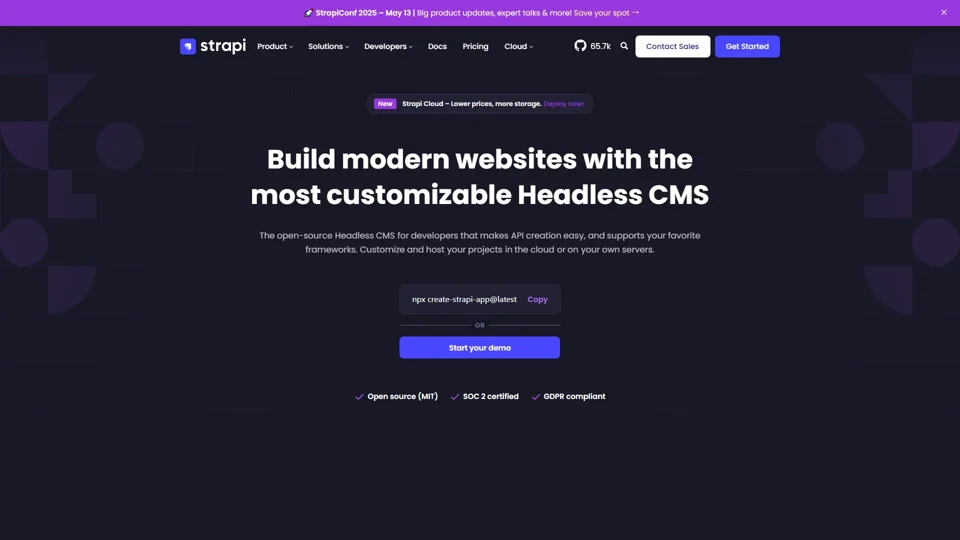What is Strapi?
Strapi is an open-source, headless CMS built on Node.js that empowers developers to create, manage, and deliver content seamlessly via REST or GraphQL APIs. Unlike traditional CMS platforms, Strapi’s headless architecture decouples the backend from the frontend, making it ideal for integrating AI-driven workflows, multi-channel content delivery, and scalable product development. It addresses challenges in AI programming by providing flexible APIs for connecting AI models, automating content pipelines, and managing structured data efficiently.
Key Features of Strapi
-
API-Centric Design: Generate REST or GraphQL APIs instantly for seamless integration with AI tools, frontend frameworks, and third-party services.
-
Custom Content Structures: Define custom content types (e.g., articles, product catalogs) to feed data into AI models or applications.
-
Plugin Ecosystem: Extend functionality with plugins for AI integrations (e.g., NLP, image recognition) via the Strapi Market.
-
Multi-Environment Support: Deploy to cloud platforms, on-premises servers, or Strapi Cloud for scalable AI-driven applications.
-
Role-Based Access Control: Secure sensitive data used in AI training or product development with granular permissions.
-
Localization Tools: Manage multilingual content for global AI applications.
How Strapi Enhances AI and Product Development
-
AI Integration: Use Strapi’s APIs to connect AI services (e.g., chatbots, recommendation engines) to your content backend.
-
Automated Workflows: Trigger AI-powered content generation (e.g., auto-tagging, summarization) via webhooks or custom plugins.
-
Unified Data Layer: Centralize structured data for training machine learning models or powering analytics dashboards.
-
Rapid Prototyping: Quickly build MVP applications with pre-configured APIs, reducing development time for AI projects.
Pricing Options
-
Community Edition (Self-Hosted): Free and open-source, ideal for startups and developers experimenting with AI integrations.
-
Enterprise Edition: Custom pricing for advanced security, compliance, and SLA support—suited for large-scale AI deployments.
-
Strapi Cloud: Managed hosting starting at $99/month (simplifies infrastructure for teams focused on AI/ML development).
Helpful Tips for AI Developers
-
Leverage Webhooks: Automate AI model retraining by triggering scripts when content updates occur.
-
Use Custom Plugins: Build connectors for AI services like OpenAI or TensorFlow Serving directly into Strapi.
-
Optimize for Scalability: Pair Strapi with serverless architectures (e.g., AWS Lambda) for cost-effective AI processing.
-
Explore Strapi Market: Install pre-built integrations for analytics (e.g., Google AI) or headless e-commerce tools.
Frequently Asked Questions
Can Strapi handle real-time data for AI applications?
Yes, its API-first design supports real-time data delivery via WebSockets or GraphQL subscriptions.
Is Strapi suitable for large-scale AI projects?
Absolutely. The Enterprise Edition offers horizontal scaling, making it ideal for high-traffic AI applications.
How does Strapi ensure data privacy for AI training?
Data is stored in your own infrastructure (self-hosted) or compliant cloud environments, with optional encryption.
Can I customize Strapi to work with proprietary AI models?
Yes, developers can extend Strapi’s backend with custom controllers and services for bespoke AI pipelines.
What makes Strapi better than other CMS for AI projects?
Its headless architecture, API flexibility, and extensibility simplify integration with modern AI/ML stacks compared to monolithic CMS platforms.
Keywords: Strapi, Headless CMS, AI Integration, API Development, Node.js, Content Management, Custom Plugins, Scalability, GraphQL, REST APIs.
By combining flexible content modeling with robust APIs, Strapi reduces the complexity of building AI-powered applications, enabling teams to focus on innovation rather than infrastructure.
